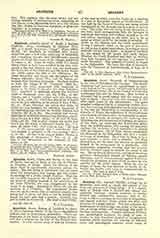

Anathoth, possibly plural of Anath, a feminine Chaldean deity, worshipped in Chanaan [Enc. Bib. s.v. Anath; Lagrange, “Juges” (Paris, 1903), 62-63]. (I) Anathoth is identified with Anata, about two and a half miles northeast of Jerusalem, and everything favors that identification; around Anata are found the names of the villages mentioned in Isaias, x, 28. From its height (2235 ft.), Anata, which seems to have been fortified in the past, commands a fine but desolate view east and southeast; the north end of the Dead Sea and the Lower Jordan are visible across the hills of the wilderness. Between Jerusalem and Anata rise the heights of the Scapus (Mesarif), where Titus and his legions encamped when besieging Jerusalem. On those heights is built the village of El `Tsawiyeh (2390 ft.), perhaps the Laisa mentioned with Anathoth in Isaias, x, 30 (Buhl, Geographie des alten Palastina, 175). Anathoth is reckoned among the Levitical cities of Benjamin (Jos., xxi, 18; I Par., vi, 60). Abiezer, one of David’s valiant men, was from that city (II K., xxiii, 27), which had also given to David one of his first followers in the person of Jehu (I Par., xii, 3). There Abiathar the priest, had lands, to which he was banished by Solomon, suspicious of the understanding between his brother Adonias and Abiathar (III K., ii, 26). One hundred and twenty-eight men of Anathoth returned from Babylon, according to the list in I Esd. (Ezra), ii, 23 and II Esdr. (Neh.), vii, 27. But its chief interest lies in the fact that it was the home of Jeremias’ family (Jer., i, 1; xxix, 27; xxxii, 7-9). But there he also, “the type of the incomparable One”, experienced that “no prophet is accepted in his own country” (Jer., xi, 21-23). (2) One of the sons of Bechor (Becher in the genealogy of Benjamin) I Par., vii, 8. (3) One of the subscribers to the covenant [II Esd. (Neh.), x, 19].
EDWARD ARBEZ

